Holmes Institute HC1062: Decision Making and ANZ Bank Ethical Report
VerifiedAdded on 2022/09/14
|12
|2601
|24
Report
AI Summary
This report examines the ethical issues faced by ANZ Bank, specifically focusing on the company's poor management and unethical practices concerning its rural customers. The paper identifies the management problem as the bank's failure to adhere to its own code of conduct, particularly in its dealings with farmers. The research questions address the degree of deviation from the code of conduct and the underlying reasons for non-compliance. The report utilizes a positivism research philosophy and an explanatory research design, relying on secondary data sources. It reviews literature on ethical issues, organizational image, and corporate social responsibility. The findings reveal that ANZ Bank's actions negatively impacted its stakeholders and public image. The report recommends that the bank adopt the ICAEW framework for dealing with ethical issues, emphasizing the identification of issues, gathering information, and identifying affected parties to prevent similar situations in the future. The report highlights the need for improved leadership and a stronger commitment to the company's core values to address these ethical challenges.
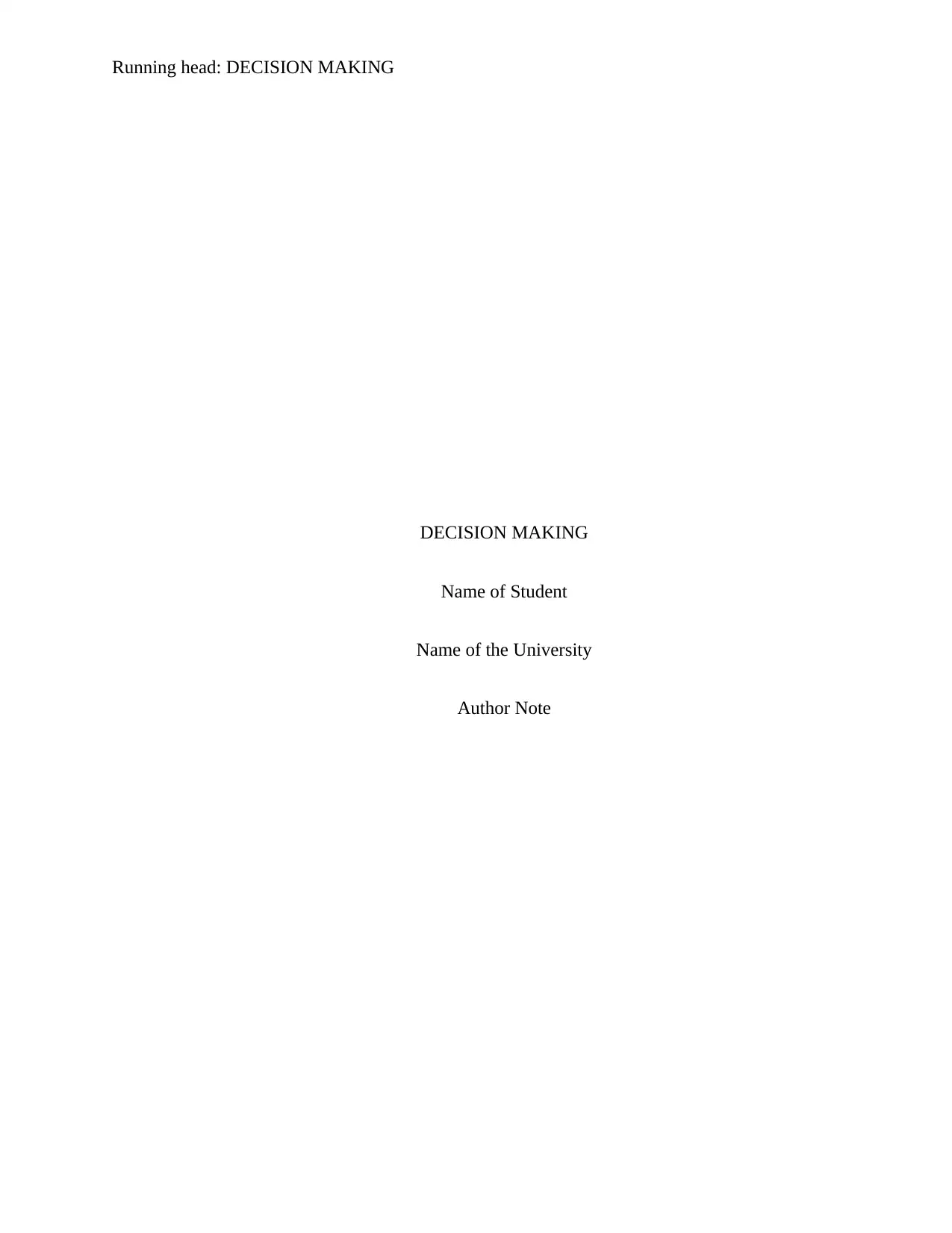
Running head: DECISION MAKING
DECISION MAKING
Name of Student
Name of the University
Author Note
DECISION MAKING
Name of Student
Name of the University
Author Note
Paraphrase This Document
Need a fresh take? Get an instant paraphrase of this document with our AI Paraphraser
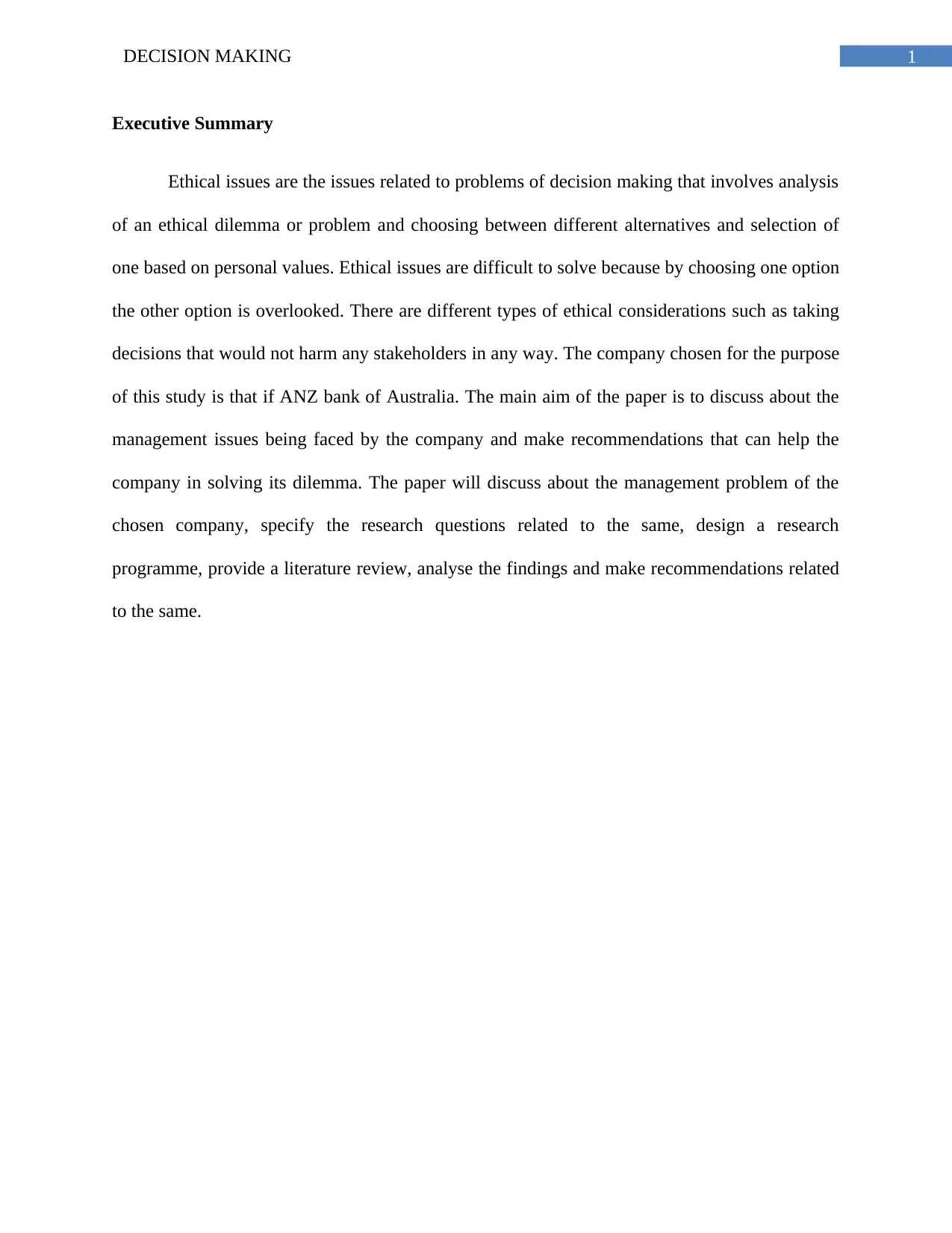
1DECISION MAKING
Executive Summary
Ethical issues are the issues related to problems of decision making that involves analysis
of an ethical dilemma or problem and choosing between different alternatives and selection of
one based on personal values. Ethical issues are difficult to solve because by choosing one option
the other option is overlooked. There are different types of ethical considerations such as taking
decisions that would not harm any stakeholders in any way. The company chosen for the purpose
of this study is that if ANZ bank of Australia. The main aim of the paper is to discuss about the
management issues being faced by the company and make recommendations that can help the
company in solving its dilemma. The paper will discuss about the management problem of the
chosen company, specify the research questions related to the same, design a research
programme, provide a literature review, analyse the findings and make recommendations related
to the same.
Executive Summary
Ethical issues are the issues related to problems of decision making that involves analysis
of an ethical dilemma or problem and choosing between different alternatives and selection of
one based on personal values. Ethical issues are difficult to solve because by choosing one option
the other option is overlooked. There are different types of ethical considerations such as taking
decisions that would not harm any stakeholders in any way. The company chosen for the purpose
of this study is that if ANZ bank of Australia. The main aim of the paper is to discuss about the
management issues being faced by the company and make recommendations that can help the
company in solving its dilemma. The paper will discuss about the management problem of the
chosen company, specify the research questions related to the same, design a research
programme, provide a literature review, analyse the findings and make recommendations related
to the same.
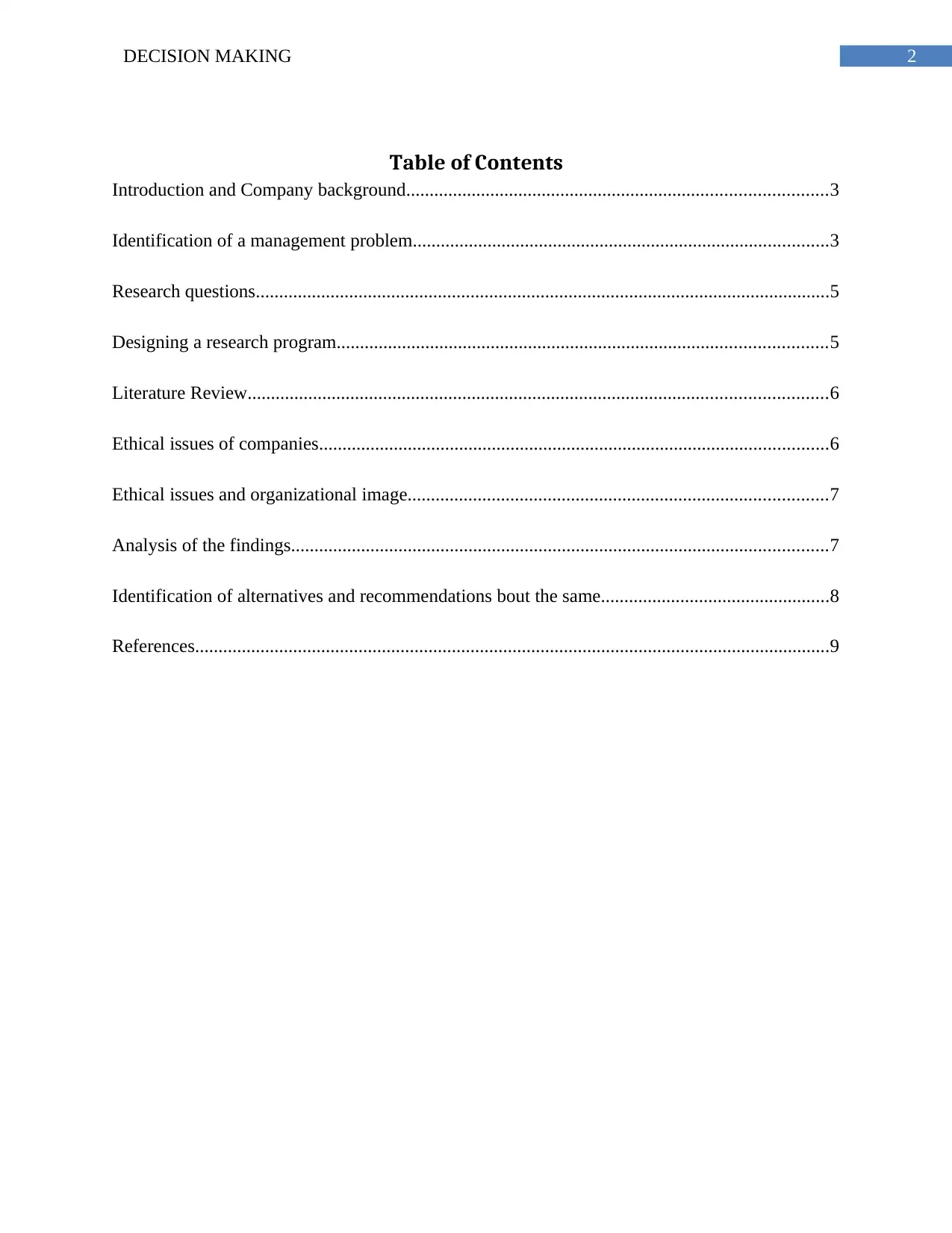
2DECISION MAKING
Table of Contents
Introduction and Company background..........................................................................................3
Identification of a management problem.........................................................................................3
Research questions...........................................................................................................................5
Designing a research program.........................................................................................................5
Literature Review............................................................................................................................6
Ethical issues of companies.............................................................................................................6
Ethical issues and organizational image..........................................................................................7
Analysis of the findings...................................................................................................................7
Identification of alternatives and recommendations bout the same.................................................8
References........................................................................................................................................9
Table of Contents
Introduction and Company background..........................................................................................3
Identification of a management problem.........................................................................................3
Research questions...........................................................................................................................5
Designing a research program.........................................................................................................5
Literature Review............................................................................................................................6
Ethical issues of companies.............................................................................................................6
Ethical issues and organizational image..........................................................................................7
Analysis of the findings...................................................................................................................7
Identification of alternatives and recommendations bout the same.................................................8
References........................................................................................................................................9
⊘ This is a preview!⊘
Do you want full access?
Subscribe today to unlock all pages.

Trusted by 1+ million students worldwide
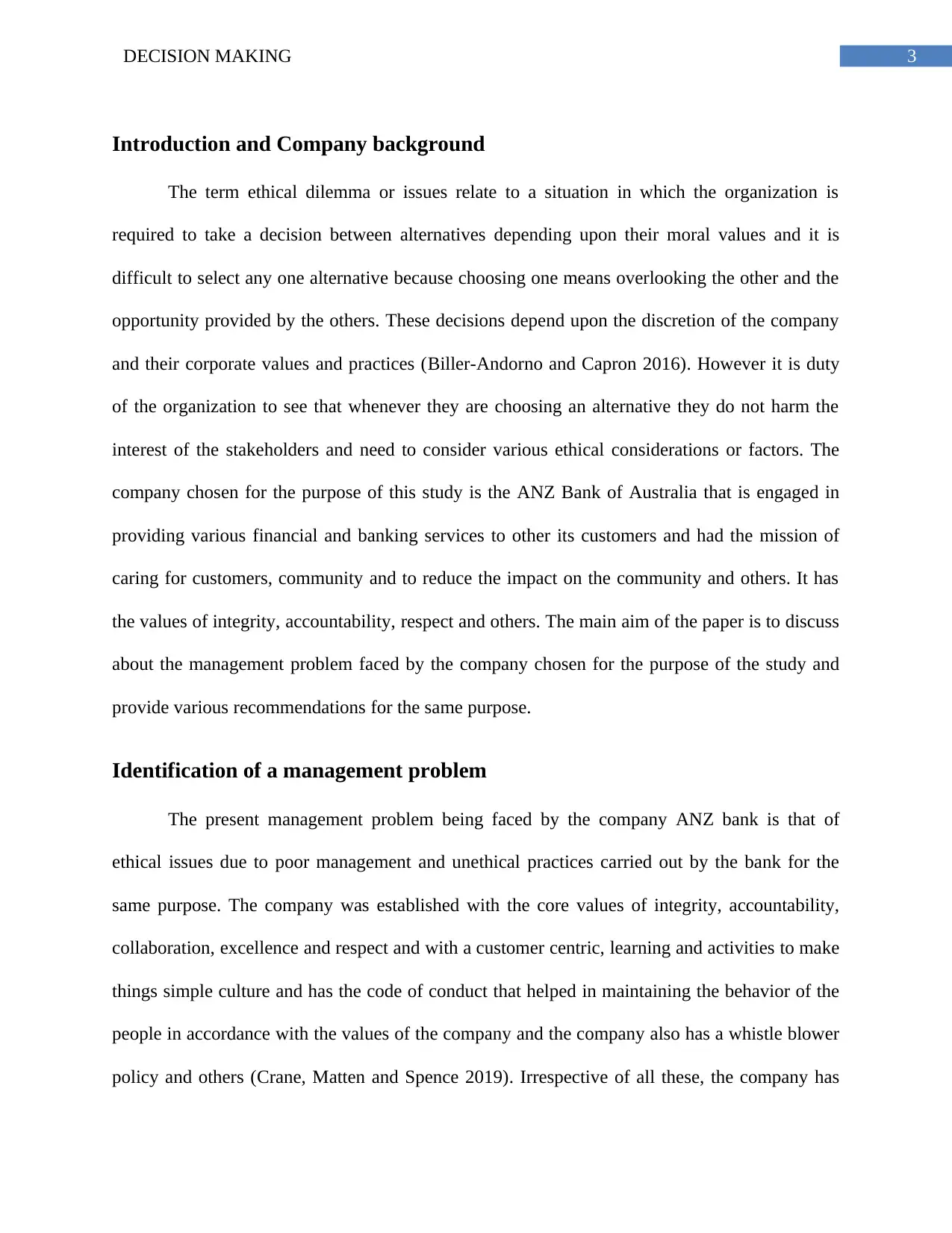
3DECISION MAKING
Introduction and Company background
The term ethical dilemma or issues relate to a situation in which the organization is
required to take a decision between alternatives depending upon their moral values and it is
difficult to select any one alternative because choosing one means overlooking the other and the
opportunity provided by the others. These decisions depend upon the discretion of the company
and their corporate values and practices (Biller-Andorno and Capron 2016). However it is duty
of the organization to see that whenever they are choosing an alternative they do not harm the
interest of the stakeholders and need to consider various ethical considerations or factors. The
company chosen for the purpose of this study is the ANZ Bank of Australia that is engaged in
providing various financial and banking services to other its customers and had the mission of
caring for customers, community and to reduce the impact on the community and others. It has
the values of integrity, accountability, respect and others. The main aim of the paper is to discuss
about the management problem faced by the company chosen for the purpose of the study and
provide various recommendations for the same purpose.
Identification of a management problem
The present management problem being faced by the company ANZ bank is that of
ethical issues due to poor management and unethical practices carried out by the bank for the
same purpose. The company was established with the core values of integrity, accountability,
collaboration, excellence and respect and with a customer centric, learning and activities to make
things simple culture and has the code of conduct that helped in maintaining the behavior of the
people in accordance with the values of the company and the company also has a whistle blower
policy and others (Crane, Matten and Spence 2019). Irrespective of all these, the company has
Introduction and Company background
The term ethical dilemma or issues relate to a situation in which the organization is
required to take a decision between alternatives depending upon their moral values and it is
difficult to select any one alternative because choosing one means overlooking the other and the
opportunity provided by the others. These decisions depend upon the discretion of the company
and their corporate values and practices (Biller-Andorno and Capron 2016). However it is duty
of the organization to see that whenever they are choosing an alternative they do not harm the
interest of the stakeholders and need to consider various ethical considerations or factors. The
company chosen for the purpose of this study is the ANZ Bank of Australia that is engaged in
providing various financial and banking services to other its customers and had the mission of
caring for customers, community and to reduce the impact on the community and others. It has
the values of integrity, accountability, respect and others. The main aim of the paper is to discuss
about the management problem faced by the company chosen for the purpose of the study and
provide various recommendations for the same purpose.
Identification of a management problem
The present management problem being faced by the company ANZ bank is that of
ethical issues due to poor management and unethical practices carried out by the bank for the
same purpose. The company was established with the core values of integrity, accountability,
collaboration, excellence and respect and with a customer centric, learning and activities to make
things simple culture and has the code of conduct that helped in maintaining the behavior of the
people in accordance with the values of the company and the company also has a whistle blower
policy and others (Crane, Matten and Spence 2019). Irrespective of all these, the company has
Paraphrase This Document
Need a fresh take? Get an instant paraphrase of this document with our AI Paraphraser
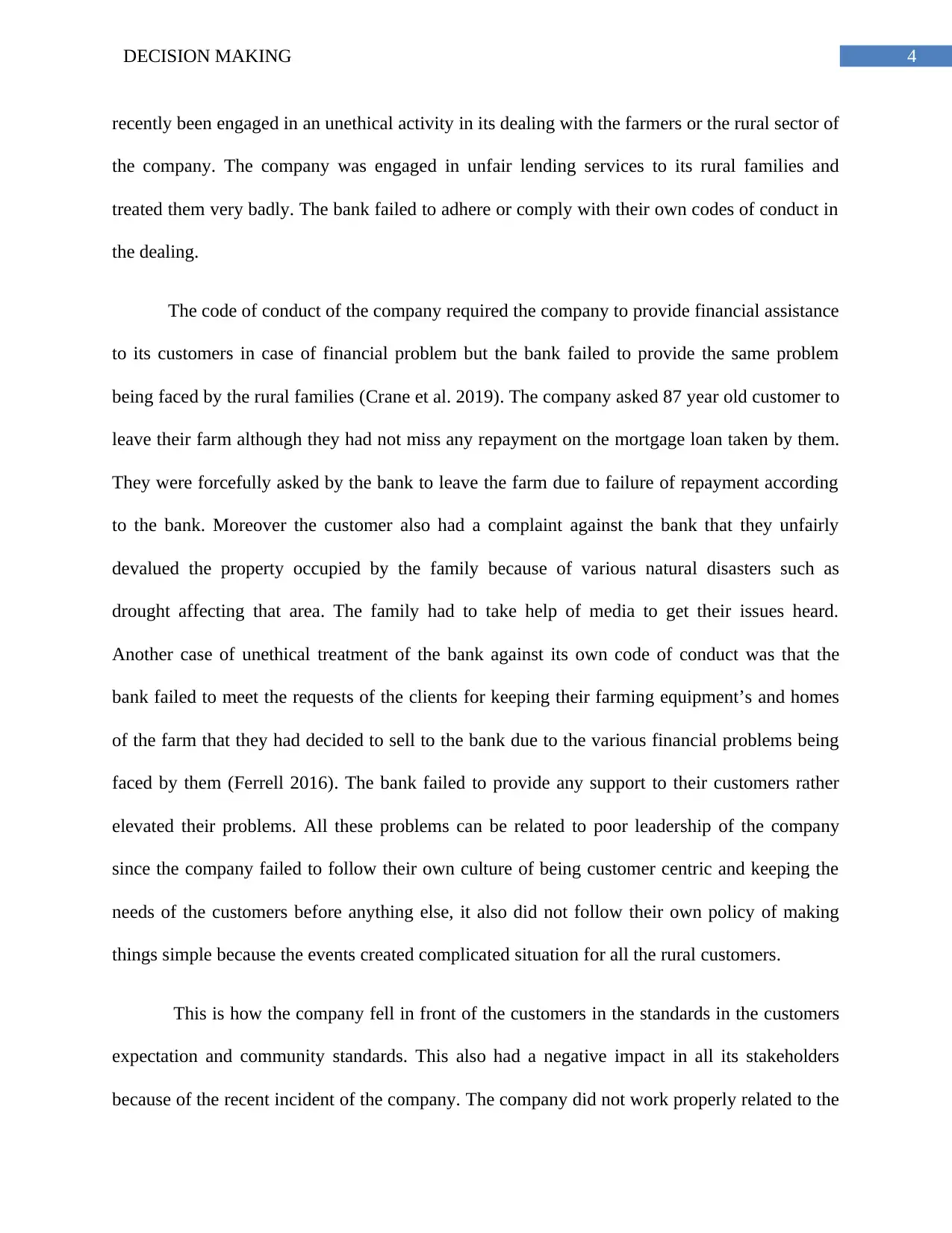
4DECISION MAKING
recently been engaged in an unethical activity in its dealing with the farmers or the rural sector of
the company. The company was engaged in unfair lending services to its rural families and
treated them very badly. The bank failed to adhere or comply with their own codes of conduct in
the dealing.
The code of conduct of the company required the company to provide financial assistance
to its customers in case of financial problem but the bank failed to provide the same problem
being faced by the rural families (Crane et al. 2019). The company asked 87 year old customer to
leave their farm although they had not miss any repayment on the mortgage loan taken by them.
They were forcefully asked by the bank to leave the farm due to failure of repayment according
to the bank. Moreover the customer also had a complaint against the bank that they unfairly
devalued the property occupied by the family because of various natural disasters such as
drought affecting that area. The family had to take help of media to get their issues heard.
Another case of unethical treatment of the bank against its own code of conduct was that the
bank failed to meet the requests of the clients for keeping their farming equipment’s and homes
of the farm that they had decided to sell to the bank due to the various financial problems being
faced by them (Ferrell 2016). The bank failed to provide any support to their customers rather
elevated their problems. All these problems can be related to poor leadership of the company
since the company failed to follow their own culture of being customer centric and keeping the
needs of the customers before anything else, it also did not follow their own policy of making
things simple because the events created complicated situation for all the rural customers.
This is how the company fell in front of the customers in the standards in the customers
expectation and community standards. This also had a negative impact in all its stakeholders
because of the recent incident of the company. The company did not work properly related to the
recently been engaged in an unethical activity in its dealing with the farmers or the rural sector of
the company. The company was engaged in unfair lending services to its rural families and
treated them very badly. The bank failed to adhere or comply with their own codes of conduct in
the dealing.
The code of conduct of the company required the company to provide financial assistance
to its customers in case of financial problem but the bank failed to provide the same problem
being faced by the rural families (Crane et al. 2019). The company asked 87 year old customer to
leave their farm although they had not miss any repayment on the mortgage loan taken by them.
They were forcefully asked by the bank to leave the farm due to failure of repayment according
to the bank. Moreover the customer also had a complaint against the bank that they unfairly
devalued the property occupied by the family because of various natural disasters such as
drought affecting that area. The family had to take help of media to get their issues heard.
Another case of unethical treatment of the bank against its own code of conduct was that the
bank failed to meet the requests of the clients for keeping their farming equipment’s and homes
of the farm that they had decided to sell to the bank due to the various financial problems being
faced by them (Ferrell 2016). The bank failed to provide any support to their customers rather
elevated their problems. All these problems can be related to poor leadership of the company
since the company failed to follow their own culture of being customer centric and keeping the
needs of the customers before anything else, it also did not follow their own policy of making
things simple because the events created complicated situation for all the rural customers.
This is how the company fell in front of the customers in the standards in the customers
expectation and community standards. This also had a negative impact in all its stakeholders
because of the recent incident of the company. The company did not work properly related to the
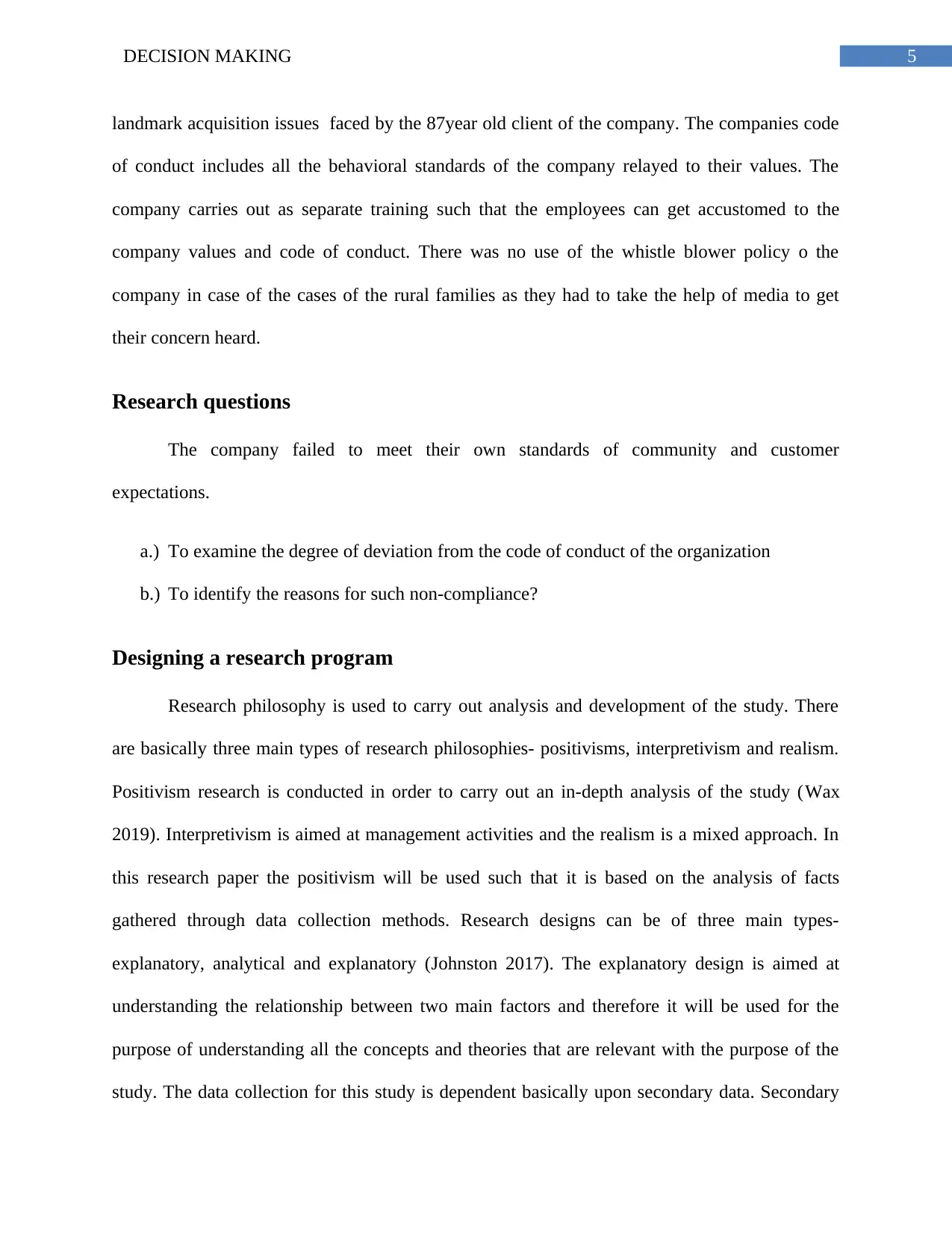
5DECISION MAKING
landmark acquisition issues faced by the 87year old client of the company. The companies code
of conduct includes all the behavioral standards of the company relayed to their values. The
company carries out as separate training such that the employees can get accustomed to the
company values and code of conduct. There was no use of the whistle blower policy o the
company in case of the cases of the rural families as they had to take the help of media to get
their concern heard.
Research questions
The company failed to meet their own standards of community and customer
expectations.
a.) To examine the degree of deviation from the code of conduct of the organization
b.) To identify the reasons for such non-compliance?
Designing a research program
Research philosophy is used to carry out analysis and development of the study. There
are basically three main types of research philosophies- positivisms, interpretivism and realism.
Positivism research is conducted in order to carry out an in-depth analysis of the study (Wax
2019). Interpretivism is aimed at management activities and the realism is a mixed approach. In
this research paper the positivism will be used such that it is based on the analysis of facts
gathered through data collection methods. Research designs can be of three main types-
explanatory, analytical and explanatory (Johnston 2017). The explanatory design is aimed at
understanding the relationship between two main factors and therefore it will be used for the
purpose of understanding all the concepts and theories that are relevant with the purpose of the
study. The data collection for this study is dependent basically upon secondary data. Secondary
landmark acquisition issues faced by the 87year old client of the company. The companies code
of conduct includes all the behavioral standards of the company relayed to their values. The
company carries out as separate training such that the employees can get accustomed to the
company values and code of conduct. There was no use of the whistle blower policy o the
company in case of the cases of the rural families as they had to take the help of media to get
their concern heard.
Research questions
The company failed to meet their own standards of community and customer
expectations.
a.) To examine the degree of deviation from the code of conduct of the organization
b.) To identify the reasons for such non-compliance?
Designing a research program
Research philosophy is used to carry out analysis and development of the study. There
are basically three main types of research philosophies- positivisms, interpretivism and realism.
Positivism research is conducted in order to carry out an in-depth analysis of the study (Wax
2019). Interpretivism is aimed at management activities and the realism is a mixed approach. In
this research paper the positivism will be used such that it is based on the analysis of facts
gathered through data collection methods. Research designs can be of three main types-
explanatory, analytical and explanatory (Johnston 2017). The explanatory design is aimed at
understanding the relationship between two main factors and therefore it will be used for the
purpose of understanding all the concepts and theories that are relevant with the purpose of the
study. The data collection for this study is dependent basically upon secondary data. Secondary
⊘ This is a preview!⊘
Do you want full access?
Subscribe today to unlock all pages.

Trusted by 1+ million students worldwide
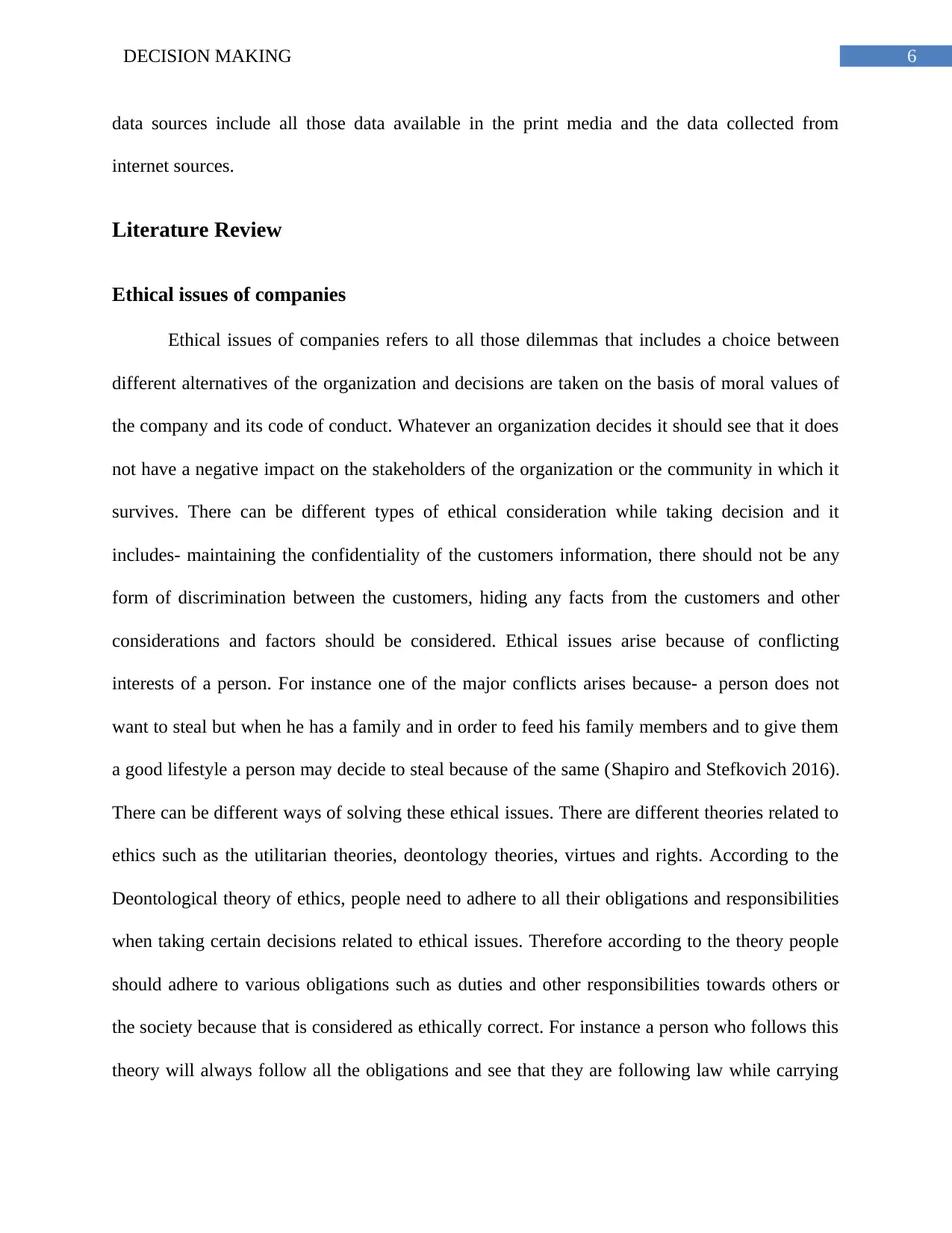
6DECISION MAKING
data sources include all those data available in the print media and the data collected from
internet sources.
Literature Review
Ethical issues of companies
Ethical issues of companies refers to all those dilemmas that includes a choice between
different alternatives of the organization and decisions are taken on the basis of moral values of
the company and its code of conduct. Whatever an organization decides it should see that it does
not have a negative impact on the stakeholders of the organization or the community in which it
survives. There can be different types of ethical consideration while taking decision and it
includes- maintaining the confidentiality of the customers information, there should not be any
form of discrimination between the customers, hiding any facts from the customers and other
considerations and factors should be considered. Ethical issues arise because of conflicting
interests of a person. For instance one of the major conflicts arises because- a person does not
want to steal but when he has a family and in order to feed his family members and to give them
a good lifestyle a person may decide to steal because of the same (Shapiro and Stefkovich 2016).
There can be different ways of solving these ethical issues. There are different theories related to
ethics such as the utilitarian theories, deontology theories, virtues and rights. According to the
Deontological theory of ethics, people need to adhere to all their obligations and responsibilities
when taking certain decisions related to ethical issues. Therefore according to the theory people
should adhere to various obligations such as duties and other responsibilities towards others or
the society because that is considered as ethically correct. For instance a person who follows this
theory will always follow all the obligations and see that they are following law while carrying
data sources include all those data available in the print media and the data collected from
internet sources.
Literature Review
Ethical issues of companies
Ethical issues of companies refers to all those dilemmas that includes a choice between
different alternatives of the organization and decisions are taken on the basis of moral values of
the company and its code of conduct. Whatever an organization decides it should see that it does
not have a negative impact on the stakeholders of the organization or the community in which it
survives. There can be different types of ethical consideration while taking decision and it
includes- maintaining the confidentiality of the customers information, there should not be any
form of discrimination between the customers, hiding any facts from the customers and other
considerations and factors should be considered. Ethical issues arise because of conflicting
interests of a person. For instance one of the major conflicts arises because- a person does not
want to steal but when he has a family and in order to feed his family members and to give them
a good lifestyle a person may decide to steal because of the same (Shapiro and Stefkovich 2016).
There can be different ways of solving these ethical issues. There are different theories related to
ethics such as the utilitarian theories, deontology theories, virtues and rights. According to the
Deontological theory of ethics, people need to adhere to all their obligations and responsibilities
when taking certain decisions related to ethical issues. Therefore according to the theory people
should adhere to various obligations such as duties and other responsibilities towards others or
the society because that is considered as ethically correct. For instance a person who follows this
theory will always follow all the obligations and see that they are following law while carrying
Paraphrase This Document
Need a fresh take? Get an instant paraphrase of this document with our AI Paraphraser
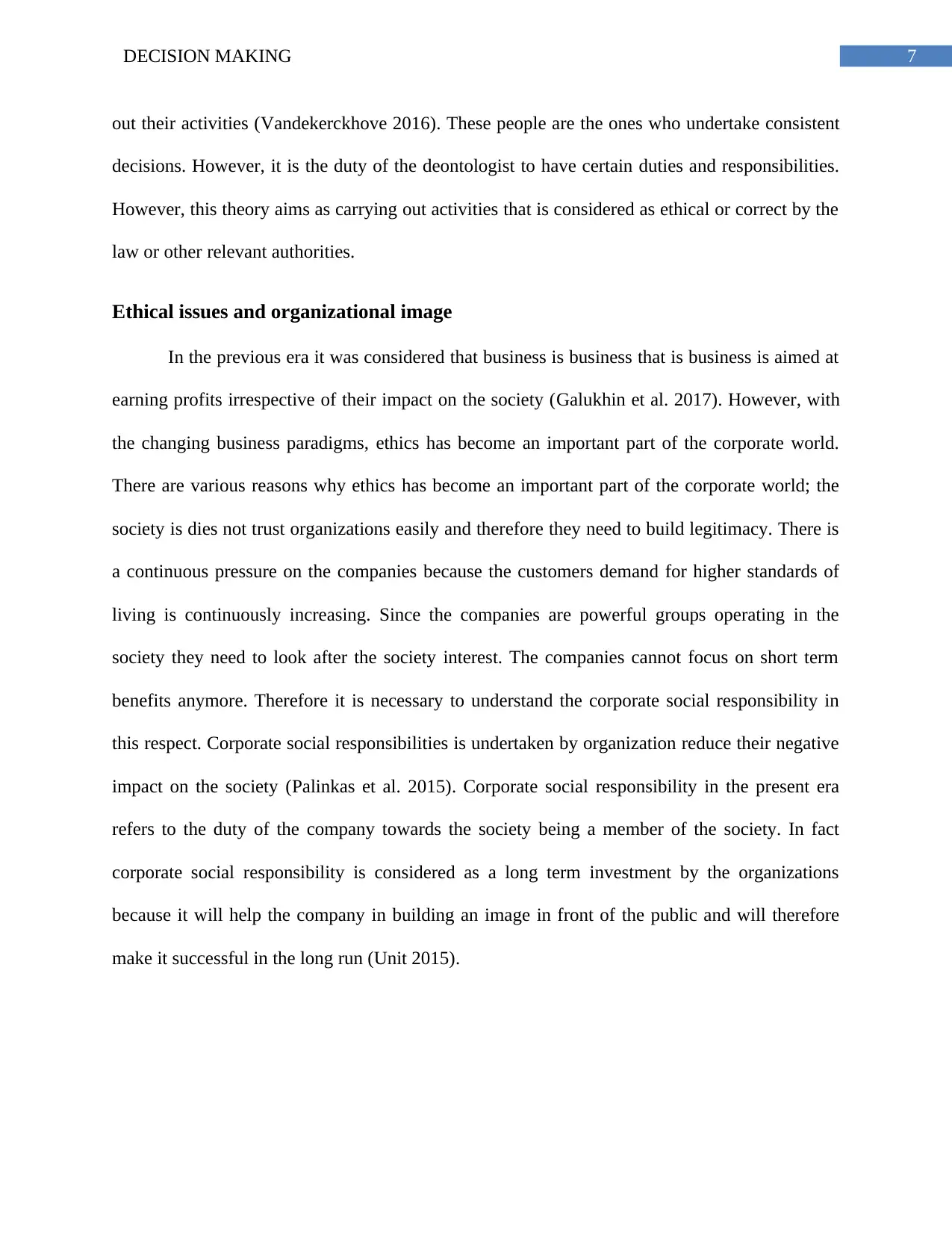
7DECISION MAKING
out their activities (Vandekerckhove 2016). These people are the ones who undertake consistent
decisions. However, it is the duty of the deontologist to have certain duties and responsibilities.
However, this theory aims as carrying out activities that is considered as ethical or correct by the
law or other relevant authorities.
Ethical issues and organizational image
In the previous era it was considered that business is business that is business is aimed at
earning profits irrespective of their impact on the society (Galukhin et al. 2017). However, with
the changing business paradigms, ethics has become an important part of the corporate world.
There are various reasons why ethics has become an important part of the corporate world; the
society is dies not trust organizations easily and therefore they need to build legitimacy. There is
a continuous pressure on the companies because the customers demand for higher standards of
living is continuously increasing. Since the companies are powerful groups operating in the
society they need to look after the society interest. The companies cannot focus on short term
benefits anymore. Therefore it is necessary to understand the corporate social responsibility in
this respect. Corporate social responsibilities is undertaken by organization reduce their negative
impact on the society (Palinkas et al. 2015). Corporate social responsibility in the present era
refers to the duty of the company towards the society being a member of the society. In fact
corporate social responsibility is considered as a long term investment by the organizations
because it will help the company in building an image in front of the public and will therefore
make it successful in the long run (Unit 2015).
out their activities (Vandekerckhove 2016). These people are the ones who undertake consistent
decisions. However, it is the duty of the deontologist to have certain duties and responsibilities.
However, this theory aims as carrying out activities that is considered as ethical or correct by the
law or other relevant authorities.
Ethical issues and organizational image
In the previous era it was considered that business is business that is business is aimed at
earning profits irrespective of their impact on the society (Galukhin et al. 2017). However, with
the changing business paradigms, ethics has become an important part of the corporate world.
There are various reasons why ethics has become an important part of the corporate world; the
society is dies not trust organizations easily and therefore they need to build legitimacy. There is
a continuous pressure on the companies because the customers demand for higher standards of
living is continuously increasing. Since the companies are powerful groups operating in the
society they need to look after the society interest. The companies cannot focus on short term
benefits anymore. Therefore it is necessary to understand the corporate social responsibility in
this respect. Corporate social responsibilities is undertaken by organization reduce their negative
impact on the society (Palinkas et al. 2015). Corporate social responsibility in the present era
refers to the duty of the company towards the society being a member of the society. In fact
corporate social responsibility is considered as a long term investment by the organizations
because it will help the company in building an image in front of the public and will therefore
make it successful in the long run (Unit 2015).
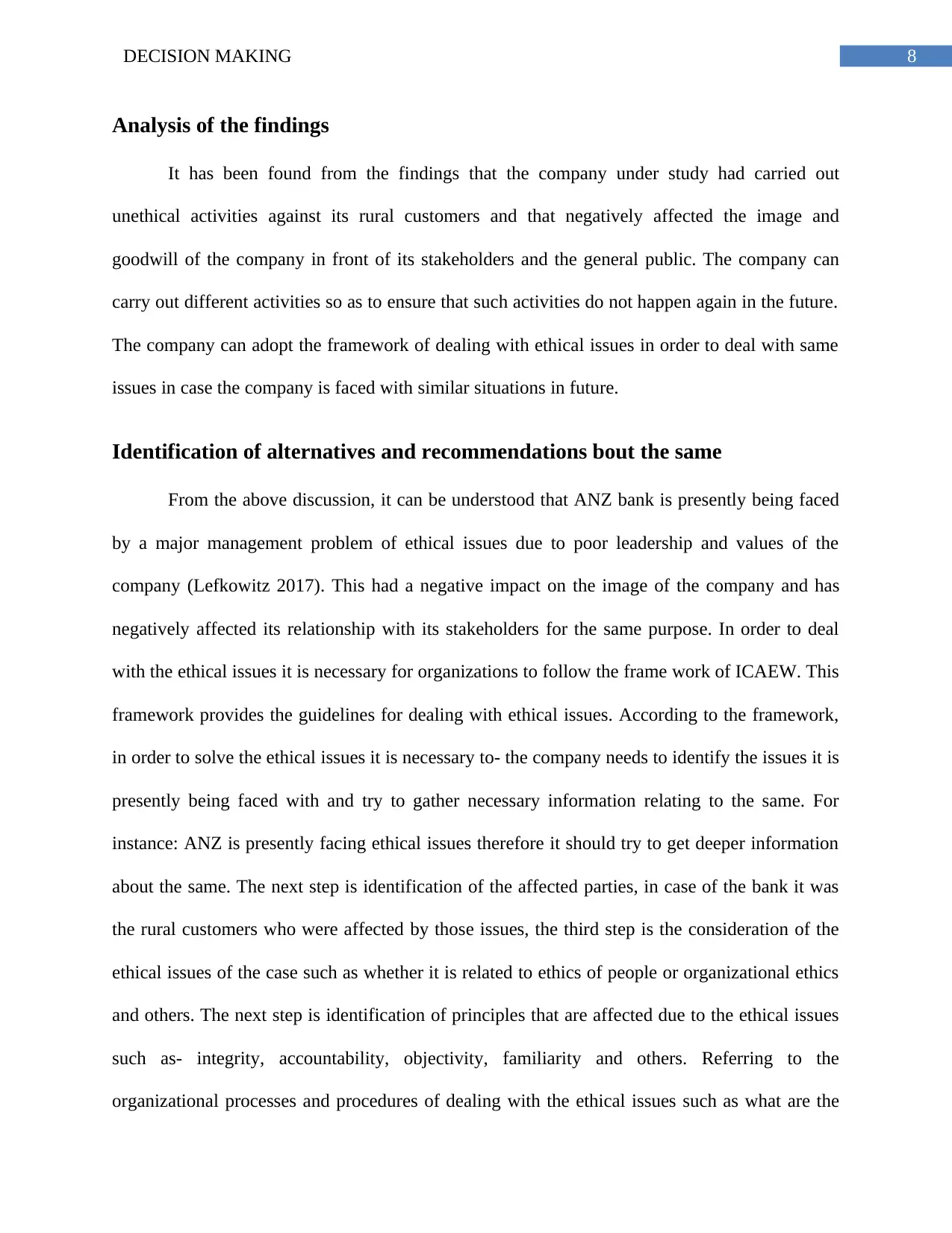
8DECISION MAKING
Analysis of the findings
It has been found from the findings that the company under study had carried out
unethical activities against its rural customers and that negatively affected the image and
goodwill of the company in front of its stakeholders and the general public. The company can
carry out different activities so as to ensure that such activities do not happen again in the future.
The company can adopt the framework of dealing with ethical issues in order to deal with same
issues in case the company is faced with similar situations in future.
Identification of alternatives and recommendations bout the same
From the above discussion, it can be understood that ANZ bank is presently being faced
by a major management problem of ethical issues due to poor leadership and values of the
company (Lefkowitz 2017). This had a negative impact on the image of the company and has
negatively affected its relationship with its stakeholders for the same purpose. In order to deal
with the ethical issues it is necessary for organizations to follow the frame work of ICAEW. This
framework provides the guidelines for dealing with ethical issues. According to the framework,
in order to solve the ethical issues it is necessary to- the company needs to identify the issues it is
presently being faced with and try to gather necessary information relating to the same. For
instance: ANZ is presently facing ethical issues therefore it should try to get deeper information
about the same. The next step is identification of the affected parties, in case of the bank it was
the rural customers who were affected by those issues, the third step is the consideration of the
ethical issues of the case such as whether it is related to ethics of people or organizational ethics
and others. The next step is identification of principles that are affected due to the ethical issues
such as- integrity, accountability, objectivity, familiarity and others. Referring to the
organizational processes and procedures of dealing with the ethical issues such as what are the
Analysis of the findings
It has been found from the findings that the company under study had carried out
unethical activities against its rural customers and that negatively affected the image and
goodwill of the company in front of its stakeholders and the general public. The company can
carry out different activities so as to ensure that such activities do not happen again in the future.
The company can adopt the framework of dealing with ethical issues in order to deal with same
issues in case the company is faced with similar situations in future.
Identification of alternatives and recommendations bout the same
From the above discussion, it can be understood that ANZ bank is presently being faced
by a major management problem of ethical issues due to poor leadership and values of the
company (Lefkowitz 2017). This had a negative impact on the image of the company and has
negatively affected its relationship with its stakeholders for the same purpose. In order to deal
with the ethical issues it is necessary for organizations to follow the frame work of ICAEW. This
framework provides the guidelines for dealing with ethical issues. According to the framework,
in order to solve the ethical issues it is necessary to- the company needs to identify the issues it is
presently being faced with and try to gather necessary information relating to the same. For
instance: ANZ is presently facing ethical issues therefore it should try to get deeper information
about the same. The next step is identification of the affected parties, in case of the bank it was
the rural customers who were affected by those issues, the third step is the consideration of the
ethical issues of the case such as whether it is related to ethics of people or organizational ethics
and others. The next step is identification of principles that are affected due to the ethical issues
such as- integrity, accountability, objectivity, familiarity and others. Referring to the
organizational processes and procedures of dealing with the ethical issues such as what are the
⊘ This is a preview!⊘
Do you want full access?
Subscribe today to unlock all pages.

Trusted by 1+ million students worldwide
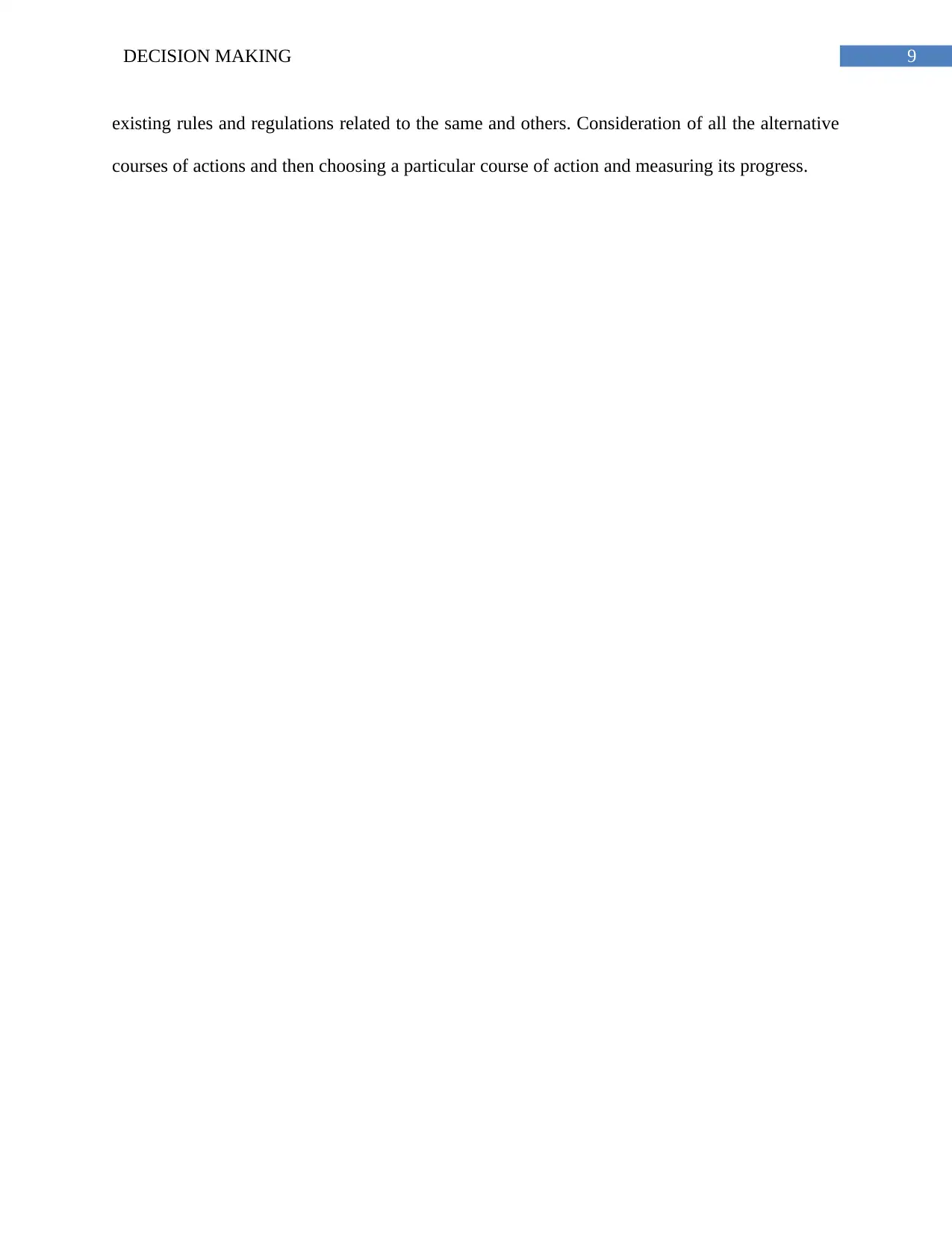
9DECISION MAKING
existing rules and regulations related to the same and others. Consideration of all the alternative
courses of actions and then choosing a particular course of action and measuring its progress.
existing rules and regulations related to the same and others. Consideration of all the alternative
courses of actions and then choosing a particular course of action and measuring its progress.
Paraphrase This Document
Need a fresh take? Get an instant paraphrase of this document with our AI Paraphraser
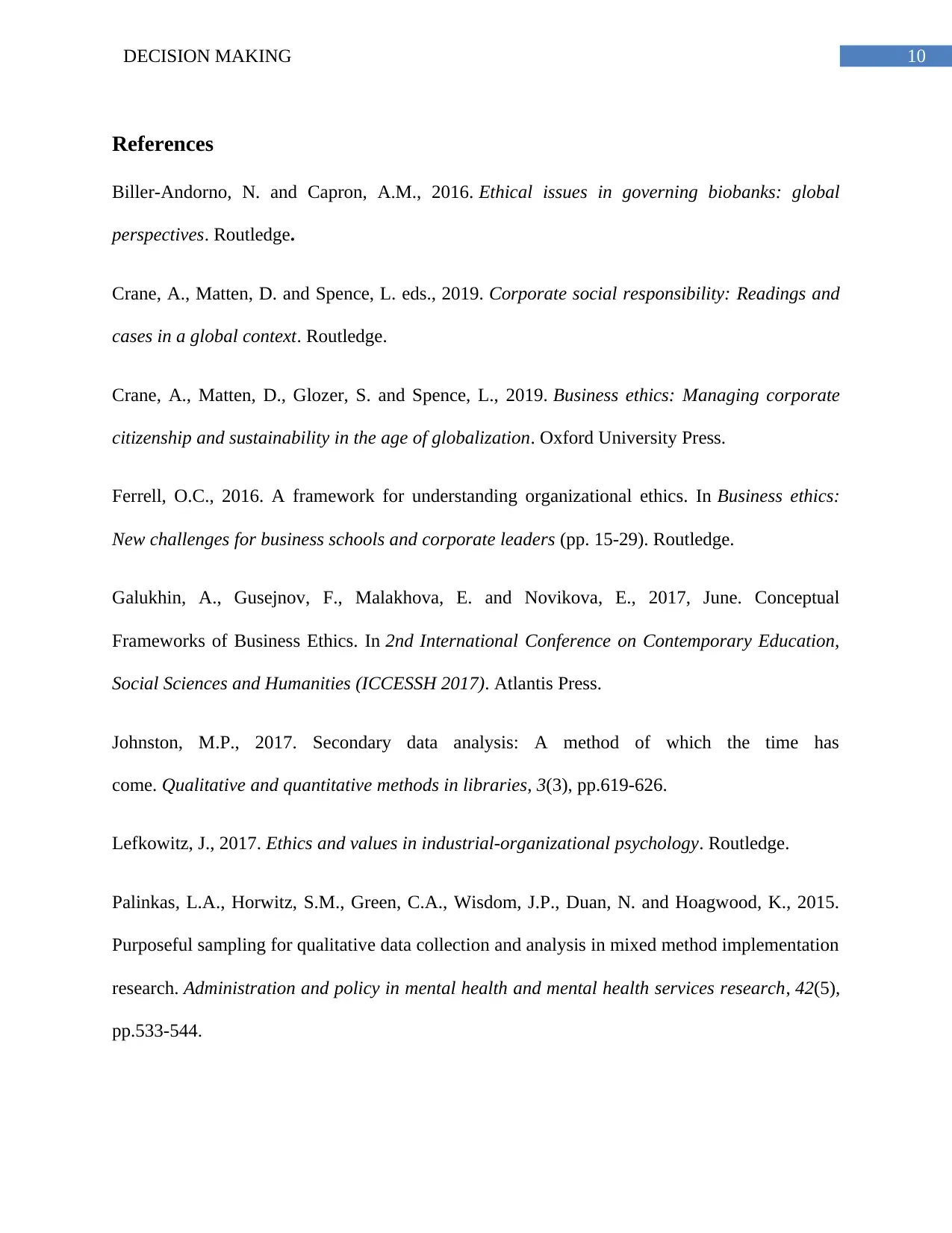
10DECISION MAKING
References
Biller-Andorno, N. and Capron, A.M., 2016. Ethical issues in governing biobanks: global
perspectives. Routledge.
Crane, A., Matten, D. and Spence, L. eds., 2019. Corporate social responsibility: Readings and
cases in a global context. Routledge.
Crane, A., Matten, D., Glozer, S. and Spence, L., 2019. Business ethics: Managing corporate
citizenship and sustainability in the age of globalization. Oxford University Press.
Ferrell, O.C., 2016. A framework for understanding organizational ethics. In Business ethics:
New challenges for business schools and corporate leaders (pp. 15-29). Routledge.
Galukhin, A., Gusejnov, F., Malakhova, E. and Novikova, E., 2017, June. Conceptual
Frameworks of Business Ethics. In 2nd International Conference on Contemporary Education,
Social Sciences and Humanities (ICCESSH 2017). Atlantis Press.
Johnston, M.P., 2017. Secondary data analysis: A method of which the time has
come. Qualitative and quantitative methods in libraries, 3(3), pp.619-626.
Lefkowitz, J., 2017. Ethics and values in industrial-organizational psychology. Routledge.
Palinkas, L.A., Horwitz, S.M., Green, C.A., Wisdom, J.P., Duan, N. and Hoagwood, K., 2015.
Purposeful sampling for qualitative data collection and analysis in mixed method implementation
research. Administration and policy in mental health and mental health services research, 42(5),
pp.533-544.
References
Biller-Andorno, N. and Capron, A.M., 2016. Ethical issues in governing biobanks: global
perspectives. Routledge.
Crane, A., Matten, D. and Spence, L. eds., 2019. Corporate social responsibility: Readings and
cases in a global context. Routledge.
Crane, A., Matten, D., Glozer, S. and Spence, L., 2019. Business ethics: Managing corporate
citizenship and sustainability in the age of globalization. Oxford University Press.
Ferrell, O.C., 2016. A framework for understanding organizational ethics. In Business ethics:
New challenges for business schools and corporate leaders (pp. 15-29). Routledge.
Galukhin, A., Gusejnov, F., Malakhova, E. and Novikova, E., 2017, June. Conceptual
Frameworks of Business Ethics. In 2nd International Conference on Contemporary Education,
Social Sciences and Humanities (ICCESSH 2017). Atlantis Press.
Johnston, M.P., 2017. Secondary data analysis: A method of which the time has
come. Qualitative and quantitative methods in libraries, 3(3), pp.619-626.
Lefkowitz, J., 2017. Ethics and values in industrial-organizational psychology. Routledge.
Palinkas, L.A., Horwitz, S.M., Green, C.A., Wisdom, J.P., Duan, N. and Hoagwood, K., 2015.
Purposeful sampling for qualitative data collection and analysis in mixed method implementation
research. Administration and policy in mental health and mental health services research, 42(5),
pp.533-544.
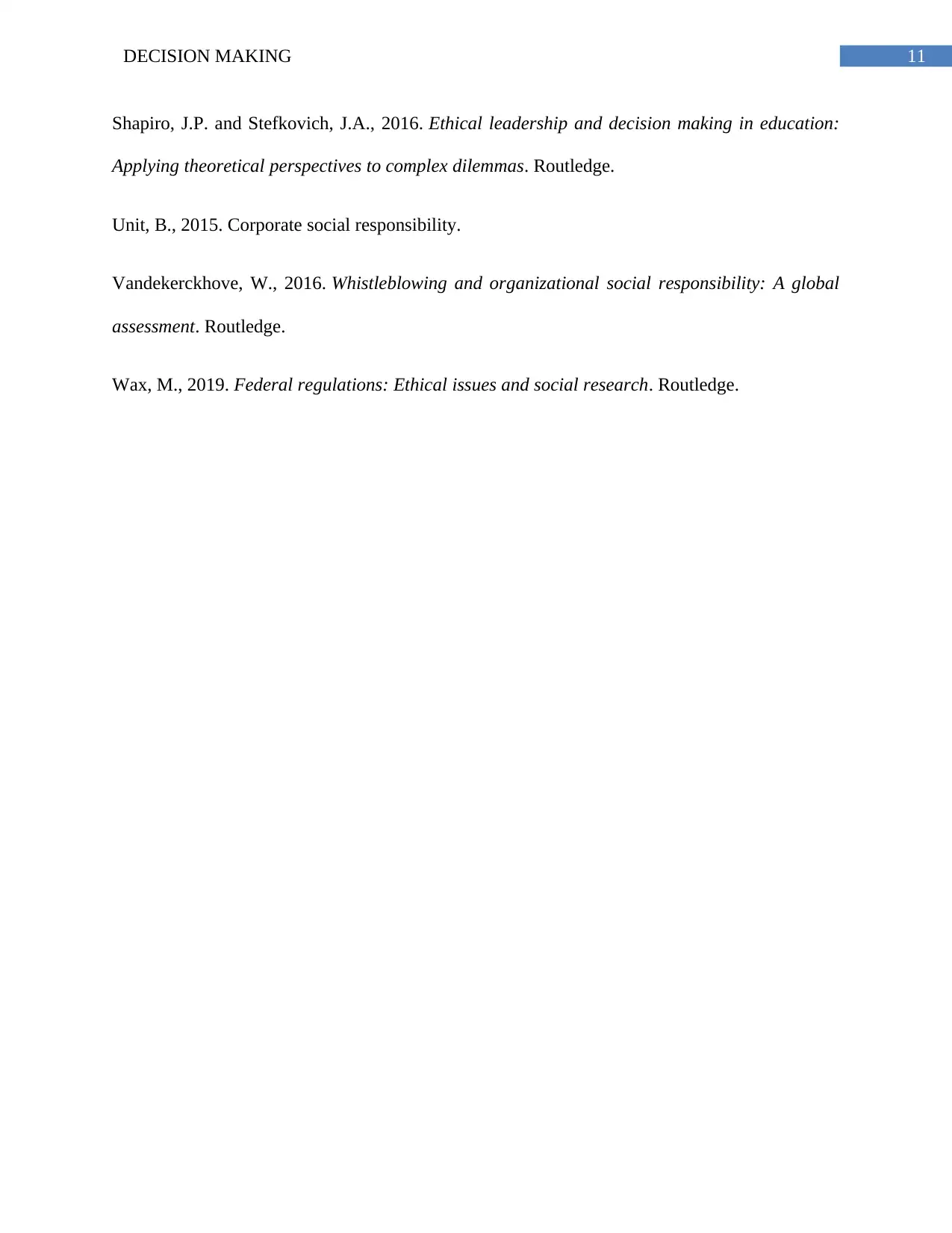
11DECISION MAKING
Shapiro, J.P. and Stefkovich, J.A., 2016. Ethical leadership and decision making in education:
Applying theoretical perspectives to complex dilemmas. Routledge.
Unit, B., 2015. Corporate social responsibility.
Vandekerckhove, W., 2016. Whistleblowing and organizational social responsibility: A global
assessment. Routledge.
Wax, M., 2019. Federal regulations: Ethical issues and social research. Routledge.
Shapiro, J.P. and Stefkovich, J.A., 2016. Ethical leadership and decision making in education:
Applying theoretical perspectives to complex dilemmas. Routledge.
Unit, B., 2015. Corporate social responsibility.
Vandekerckhove, W., 2016. Whistleblowing and organizational social responsibility: A global
assessment. Routledge.
Wax, M., 2019. Federal regulations: Ethical issues and social research. Routledge.
⊘ This is a preview!⊘
Do you want full access?
Subscribe today to unlock all pages.

Trusted by 1+ million students worldwide
1 out of 12
Related Documents
Your All-in-One AI-Powered Toolkit for Academic Success.
+13062052269
info@desklib.com
Available 24*7 on WhatsApp / Email
![[object Object]](/_next/static/media/star-bottom.7253800d.svg)
Unlock your academic potential
Copyright © 2020–2026 A2Z Services. All Rights Reserved. Developed and managed by ZUCOL.





